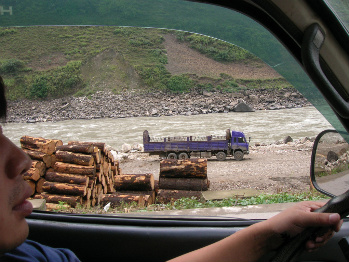The illegal wood trade from Myanmar (also known as Burma) to China has slowed, but it still threatens Myanmar’s tropical forests and species, according to a new report by Global Witness.
From 2005 and 2008 improved border controls into China led to a drop in imports of logs and sawn wood by 70 percent.
“Clearly action taken by authorities in China and Myanmar to combat illegal logging in Kachin state has had a significant positive impact. But they should do more to close down the remaining industry, which is almost wholly reliant on the illegal timber supply from Myanmar,” said Jon Buckrell, Global Witness’ Head of Forest Policy. “The Chinese government aspires to achieve a ‘harmonious society’ but the continued destruction of Myanmar’s northern frontier forests, largely by Chinese companies, provides a striking counterpoint to that vision.”
 Illegal timber trade in Myanmar. Photo courtesy of Global Witness. |
Illegal wood that still makes its way across the border does so at night often using falsified documents to get past border control. There are also reports of bribery.
“You do not have to care about any procedures. If you bring money, business is simple. When you get the timber to Yingjiang you simply change the SFA certificate for timber transportation, and it can be transported anywhere in China. That’s all,” a timber trader explained to Global Witness in 2007 in Yunnan Province.
Much of the illegally logged wood that has been transported from Myanmar to China is sold to Chinese firms for making furniture and flooring. These firms then export finished products to the United States and Europe. The Global Witness Report found a number of US floor companies that are still advertising illegal logged wood from Myanmar despite the ban on illegal wood recently put in place by the Lacey Act.
 Illegal timber trade in Myanmar. Photo courtesy of Global Witness. |
According to the report, China is rife with illegal wood: up to half of the nation’s wood imports may be illegal and China likely accounts a quarter of all illegal wood traded internationally, much of this making its way into Europe and the US where consumers demand cheap wood products.
With one of the highest deforestation rates in the world, Myanmar’s forests have been under assault for decades. Between 1990 and 2005 the country lost 18 percent of its total forests to logging, agriculture, and fuel wood collection. Currently, less than one percent of Myanmar is under protection and this is unlikely to change due to the nation’s military government.
A Disharmonious Trade: China and the continued destruction of Burma’s northern frontier forests
Related articles
China’s log imports fall 19% in first half of 2008 due to high prices
(08/27/2008) China’s imports of raw logs plunged 18.7 percent by volume for the first half of 2008 due to rising prices and a cooling Chinese economy, reports the International Tropical Timber Organization.
Massive deforestation of mangroves may have worsened scale of disaster in Burma
(05/13/2008) Weeks after the devastating cyclone Nagris struck Myanmar’s Irrawaddy Delta on May 2nd, scientists and the media are debating the role in the scale of the disaster played by the region’s deforestation of mangroves. According to recent studies, mangrove forests act as a buffer against the effect’s of tropical storms like Nagris, though scientists don’t yet fully understand the relationship between storm mitigation and mangroves.
Chinese demand drives global deforestation
(06/10/2007) From outside, Cameroon’s Ngambe-Tikar forest looks like a compact, tangled mass of healthy emerald green foliage. But tracks between the towering tropical hardwood trees open up into car park-sized clearings littered with logs as long as buses. Forestry officers say the reserve is under attack from unscrupulous commercial loggers who work outside authorized zones and do not respect size limits in their quest for maximum financial returns.